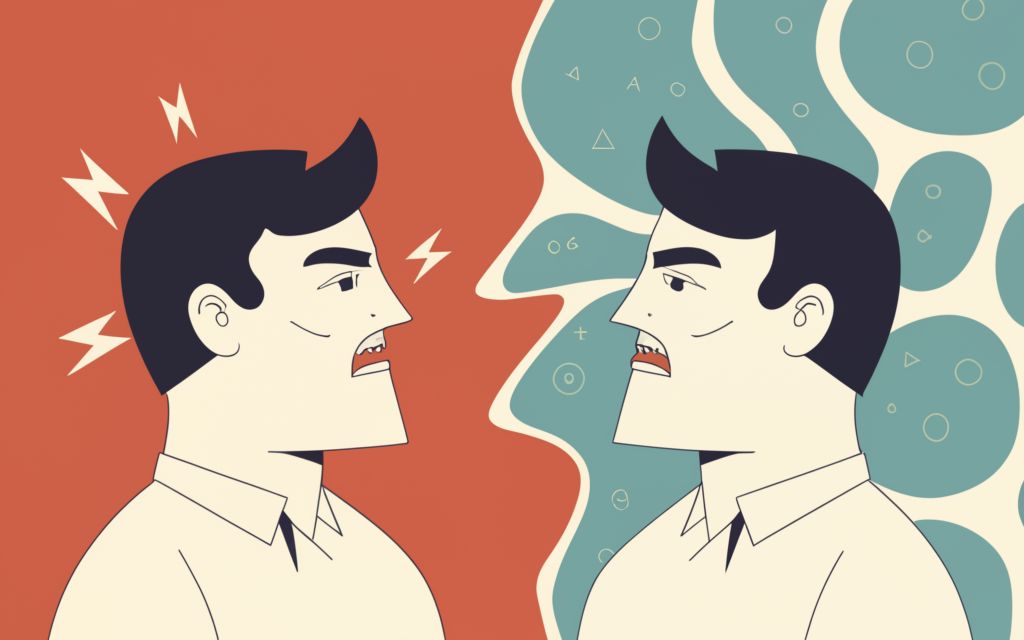Bipolar disorder is a complex mental health condition characterized by extreme mood swings that include emotional highs (mania or hypomania) and lows (depression). These shifts in mood can be disruptive to daily life and relationships.
Bipolar disorder, formerly known as manic depression, is a complex mental health condition characterized by extreme mood swings. These swings range from emotional highs (mania or hypomania) to lows (depression), often impacting daily life significantly.
Types of Bipolar Disorder
There are several types of bipolar disorder:
- Bipolar I disorder involves manic episodes that last at least 7 days or are severe enough to require immediate hospitalization. Depressive episodes also occur.
- Bipolar II disorder is characterized by a pattern of depressive episodes alternating with hypomanic episodes.
- The cyclothymic disorder involves periods of hypomanic symptoms as well as periods of depressive symptoms lasting for at least 2 years in adults.
Differences Between Bipolar I and Bipolar II Disorders
| Aspect | Bipolar I Disorder | Bipolar II Disorder |
|---|---|---|
| Manic Episodes | Present | Absent or hypomanic episodes |
| Depressive Episodes | Present | Present |
| Severity | Severe | Moderate to severe |
| Diagnosis | Requires at least one manic episode | Requires at least one hypomanic episode and one major depressive episode |
| Treatment Approach | Often requires hospitalization during manic episodes | May respond well to mood stabilizers and psychotherapy |
Understanding bipolar disorder and its management strategies is crucial for individuals affected by this condition. With proper diagnosis, treatment, and support, individuals with bipolar disorder can lead fulfilling lives and manage their symptoms effectively.
Causes and Risk Factors of Bipolar Disorder

The exact causes of bipolar disorder are not fully understood, but several factors may contribute:
- Genetic predisposition: Bipolar disorder tends to run in families.
- Neurobiological factors: Imbalances in neurotransmitters such as serotonin, dopamine, and norepinephrine may play a role.
- Environmental triggers: Stressful life events, trauma, and substance abuse can trigger or exacerbate bipolar symptoms.
Symptoms of Bipolar Disorder
Symptoms of bipolar disorder vary depending on the type and severity of the mood episodes:
- Manic episodes: Elevated mood, increased energy, racing thoughts, reckless behavior.
- Depressive episodes: Sadness, loss of interest in activities, fatigue, changes in appetite and sleep patterns.
Mania/Hypomania:
-
- Feeling euphoric or excessively happy
- Increased energy and activity levels
- Racing thoughts and difficulty concentrating
- Grandiose ideas or inflated self-esteem
- Impulsive behavior, poor judgment
- Decreased need for sleep
Depression:
-
- Persistent feeling of sadness or emptiness
- Loss of interest or pleasure in activities
- Significant changes in appetite or sleep
- Difficulty thinking, concentrating, or making decisions
- Feelings of worthlessness or guilt
- Recurrent thoughts of death or suicide
How Do I Know If I’m Bipolar?

It’s crucial to note that only a qualified mental health professional can diagnose bipolar disorder. While experiencing mood swings is common, the key distinctions for bipolar disorder are the intensity, duration, and impact on daily life. If you experience these symptoms for extended periods (mania for at least 7 days or depression lasting at least 2 weeks) and they significantly disrupt your relationships, work, or overall well-being, seeking professional help is crucial.
How Does a Bipolar Person Feel?
Emotions in bipolar disorder are intense and fluctuate rapidly. During manic episodes, individuals might feel euphoric, energized, and invincible, but this can quickly shift to irritability, racing thoughts, and impulsive actions that can have negative consequences. Depressive episodes, on the other hand, can bring overwhelming sadness, hopelessness, and difficulty finding joy in everyday activities. It’s important to remember that these experiences are unique to each individual.
Can I Live a Normal Life with Bipolar?
Absolutely! While bipolar disorder presents challenges, with proper diagnosis, treatment, and support, individuals can manage their symptoms and lead fulfilling lives. Effective treatment often involves a combination of medication and therapy, along with healthy lifestyle choices and strong social support networks.
Can a Bipolar Person Seem Normal?
Yes, people with bipolar disorder can appear “normal” during periods of stability. They may function well, manage daily tasks, and maintain healthy relationships. However, it’s important to remember that the illness is ongoing, and symptoms can reemerge. The stigma surrounding mental illness can create additional challenges, making it difficult for individuals to seek help or disclose their diagnosis openly.
Remember:
- Bipolar disorder is a treatable condition, and seeking professional help is crucial for managing symptoms and achieving well-being.
- The experience of bipolar disorder varies greatly between individuals.
- Understanding and supporting individuals with bipolar disorder can help them navigate their journey and live fulfilling lives.
Diagnosis of Bipolar Disorder
Diagnosing bipolar disorder involves a thorough psychiatric evaluation, including a detailed medical history, physical examination, and psychological assessment. The Diagnostic and Statistical Manual of Mental Disorders (DSM-5) criteria are used to diagnose bipolar disorder.
Treatment Options for Bipolar Disorder
Treatment for bipolar disorder typically involves a combination of medication, psychotherapy, and lifestyle changes:
- Medications: Mood stabilizers, antipsychotics, and antidepressants may be prescribed to manage mood symptoms.
- Psychotherapy: Cognitive-behavioral therapy (CBT), psychoeducation, and family therapy can help individuals understand and manage their symptoms.
- Lifestyle modifications: Regular sleep patterns, stress management techniques, and avoiding alcohol and drugs can help stabilize mood.
Management of Bipolar Disorder

Managing bipolar disorder requires ongoing monitoring and support:
- Developing a treatment plan with healthcare providers and adhering to medication regimens.
- Building a support network of family, friends, and mental health professionals.
- Recognizing early warning signs of mood episodes and seeking help when needed.
- Engaging in self-care practices such as exercise, healthy eating, and relaxation techniques.
Complications and Comorbidities of Bipolar Disorder
Bipolar disorder can be associated with various complications and comorbidities, including substance abuse, anxiety disorders, eating disorders, and suicidal ideation. Early intervention and effective treatment can help prevent these complications.
Living with Bipolar Disorder: Coping Strategies and Support
Living with bipolar disorder can be challenging, but there are strategies and resources available to help individuals cope:
- Participating in support groups, peer-led programs, and online communities.
- Educating oneself and loved ones about bipolar disorder and its management.
- Developing a crisis plan for emergencies and accessing mental health services when needed.
FAQs About Bipolar Disorder
What causes bipolar disorder?
Bipolar disorder is believed to be caused by a combination of genetic, biological, and environmental factors. While the exact cause is not fully understood, research suggests that imbalances in neurotransmitters, changes in brain structure and function, and genetic predisposition contribute to the development of bipolar disorder. Environmental triggers such as stress, trauma, substance abuse, and major life changes can also influence the onset and course of the disorder.
What are the symptoms of bipolar disorder?
The symptoms of bipolar disorder vary depending on the type and severity of mood episodes. During manic episodes, individuals may experience elevated mood, increased energy, racing thoughts, impulsivity, and risky behavior. Depressive episodes are characterized by feelings of sadness, hopelessness, loss of interest in activities, changes in appetite and sleep patterns, and thoughts of suicide or death. Some individuals may also experience mixed episodes, where symptoms of mania and depression occur simultaneously.
How is bipolar disorder diagnosed?
Diagnosing bipolar disorder involves a comprehensive psychiatric evaluation conducted by a mental health professional. The evaluation includes a detailed medical history, physical examination, and assessment of symptoms using standardized criteria outlined in the Diagnostic and Statistical Manual of Mental Disorders (DSM-5). The healthcare provider may also order laboratory tests and imaging studies to rule out other medical conditions that may mimic bipolar disorder.
What are the treatment options for bipolar disorder?
Treatment for bipolar disorder typically involves a combination of medication, psychotherapy, and lifestyle modifications. Mood stabilizers, antipsychotics, and antidepressants are commonly prescribed to manage mood symptoms. Psychotherapy techniques such as cognitive-behavioral therapy (CBT), psychoeducation, and family therapy can help individuals develop coping skills, improve medication adherence, and prevent relapse. Lifestyle modifications such as maintaining a regular sleep schedule, reducing stress, and avoiding alcohol and drugs are also important aspects of treatment.
Can bipolar disorder be cured?
Bipolar disorder is a chronic mental health condition that requires lifelong management. While there is no cure for bipolar disorder, with proper treatment and support, many individuals can effectively manage their symptoms and lead productive lives. Individuals with bipolar disorder need to work closely with healthcare providers to develop a treatment plan that meets their unique needs and goals.
Is bipolar disorder hereditary?
Yes, there is evidence to suggest that bipolar disorder has a strong genetic component. Individuals with a family history of bipolar disorder or other mood disorders are at a higher risk of developing the condition themselves. However, genetics is just one of several factors that contribute to the development of bipolar disorder, and not everyone with a family history will develop the disorder.
Can stress trigger bipolar episodes?
Yes, stress can be a significant trigger for bipolar episodes. Major life events, relationship conflicts, financial problems, work-related stress, and other sources of chronic stress can exacerbate mood symptoms and increase the risk of mood episodes in individuals with bipolar disorder. Learning effective stress management techniques, maintaining a healthy lifestyle, and seeking support from loved ones and mental health professionals can help individuals better cope with stress and reduce the risk of mood episodes.
How does bipolar disorder affect relationships?
Bipolar disorder can impact relationships in various ways. Mood swings, unpredictable behavior, and changes in energy levels can strain relationships with family members, friends, romantic partners, and coworkers. Communication difficulties, conflicts, and emotional instability may also arise, leading to challenges in maintaining healthy relationships. However, with understanding, patience, and support from loved ones, individuals with bipolar disorder can navigate the ups and downs of their condition and cultivate meaningful connections.
Can people with bipolar disorder work?
Yes, many people with bipolar disorder can work and pursue meaningful careers. However, maintaining employment may require accommodations, flexibility, and support from employers and coworkers. Individuals with bipolar disorder may benefit from strategies such as disclosing their condition to their employer, establishing a supportive work environment, and developing coping mechanisms to manage stress and maintain stability while on the job.
Is bipolar disorder the same as mood swings?
No, bipolar disorder is not the same as typical mood swings. While everyone experiences fluctuations in mood from time to time, bipolar disorder involves extreme and often uncontrollable shifts between manic and depressive states. These mood swings can significantly disrupt daily functioning, relationships, and overall quality of life. Unlike typical mood swings, which are temporary and often triggered by specific events or circumstances, the mood episodes in bipolar disorder are more intense, prolonged, and cyclical.





